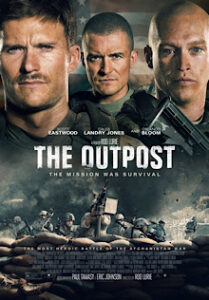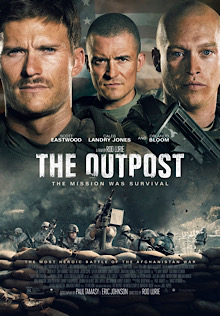The Outpost
Posted on July 2, 2020 at 5:50 pm
A-| Lowest Recommended Age: | Mature High Schooler |
| MPAA Rating: | Rated R for war violence and grisly images, pervasive language, and sexual references |
| Profanity: | Constant very strong and crude language |
| Alcohol/ Drugs: | Substance abuse, smoking |
| Violence/ Scariness: | Intense wartime peril and violence, very graphic and disturbing images, many characters injured and killed, possible suicide attempt |
| Diversity Issues: | None |
| Date Released to Theaters: | July 3, 2020 |

The script by Eric Johnson and Paul Tamasy wisely avoids the usual expository dialogue as a newcomer is introduced to the group. Instead, we get a crisp, military briefing-style scene-setting with on-screen text informing us that the military has set up outposts in areas that are impossible to defend and given the 53 soldiers there the impossible task of both befriending the locals and fighting off the Taliban. This one is Combat Outpost Keating, located in a near-indefensible mountain-enclosed area in Afghanistan 14 miles from the Pakistani border.
Lurie and his cast, including Orlando Bloom, Scott Eastwood, and breakout star Caleb Landry Jones, understand the small revelatory moments, the trash-talk and taunting that is the way people away from home and coping with unendurable uncertainty connect to each other. Then there are the brief calls home when they pretend to be normal and maintain those connections. As a sign nearby reminds them to keep the calls to 10 minutes, one soldier puffs away while assuring his wife that he stopped smoking. A series of new commanding officers each bring his own ideas and style of communication. Over the course of the movie, we see how much we expect from the military, from 21st century warfare to diplomacy. Over the closing credits, we get a devastating reminder of how heartbreakingly young these soldiers are.
There are telling moments in the interactions with the locals. The soldiers do their best to implement the policies they are there to carry out, which means “soft power” like paying them for their people who have been killed as collateral damage or even as enemy or possibly those who are dead by other means but maybe a way to get more money from the Americans. “I will lose my honor with my elders,” one explains via a translator. “I can regain my honor one of two ways. One way is for all of you to lay down your arms and watch as your communities flourish with the help of the US and Allah.” That support comes in the form of “money, contracts, projects.” The other way does not need to be explained to the Afghanis or to us. The outpost also has to develop sources of intelligence in a place where there is no reason for anyone to trust them and they do not speak the language. There is a local version of the boy who cried wolf, constantly warning of an attack but with no useful details. And then there are the attacks, always expected yet always unexpected because they never know when.
Impeccable camerawork from Lorenzo Senatore and editing by Michael J. Duthie give the film a documentary feel matched by understated, natural performances from the cast. We feel their exhaustion. And we feel their dedication, more important even than their training or their courage. Their loyalty to each other in the face of risk so dire the outpost is known as Camp Custer is itself the answer to the question the story raises about purpose, meaning, and why we are here. The question of why we are there it is wise enough not to try to resolve.
Parents should know that this is a war movie with constant, intense, and graphic military and terrorist violence, disturbing images, characters injured and killed, constant very strong and crude language, sexual humor, smoking and substance abuse.
Family discussion: Which was the best commanding officer of the outpost? How do the soldiers manage their stress?
If you like this, try: “Beaufort” and “1917”

